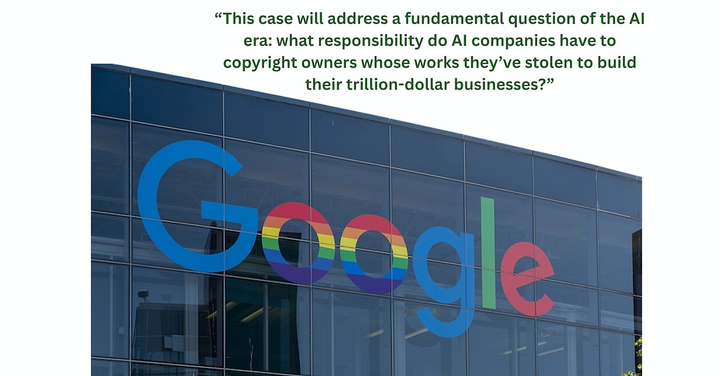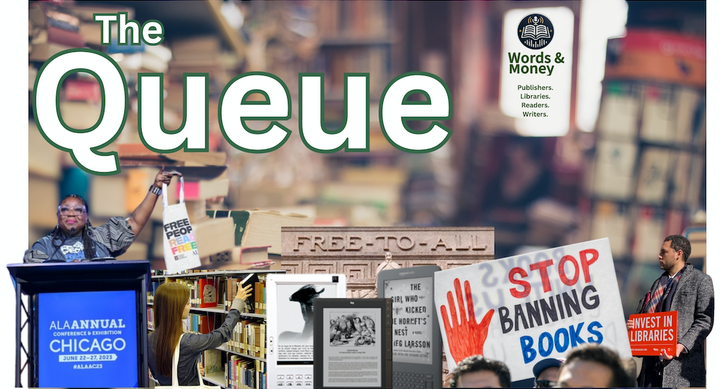The Queue: Library News for the Week Ending May 16, 2025
Among the week's headlines: Authors, library groups urge Congress to resist Trump's Library of Congress takeover; Rhode Island advances its Freedom to Read bill; Patmos Library staff quit over board concerns; and IFLA is alarmed by 'fear and intimidation' facing U.S. librarians.
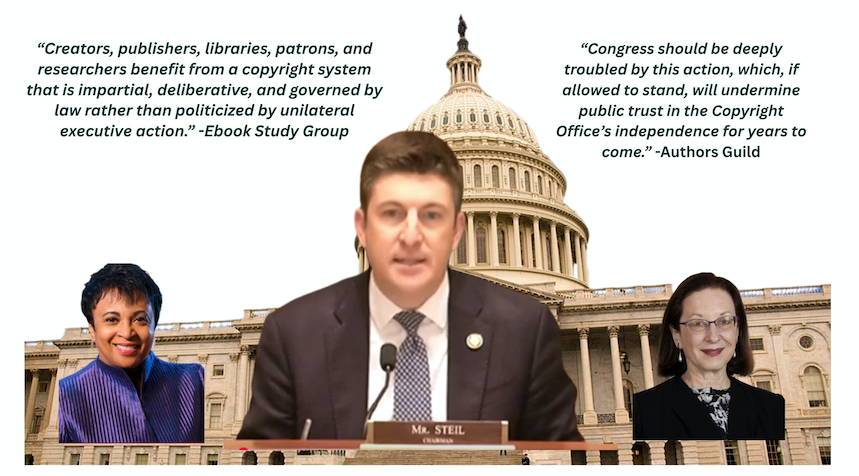
As Politico reported this week, the Library of Congress and the U.S. Copyright Office remain embroiled in a high stakes turf battle with the Trump administration following the abrupt firings of the Librarian of Congress and the Register of Copyrights. And this week, two industry organizations, the eBook Study Group and the Authors Guild, launched campaigns urging Congress to stand up and assert its control and oversight over the library.
In a May 13 letter, the eBook Study Group, a group of librarians and supporters that formed in 2023 to advocate for a fair digital library market, urged Rep. Bryan Steil (R-WI), who chairs the Joint Committee on the Library, to "immediately convene a hearing to examine the circumstances" surrounding the dismissals of both Librarian of Congress Carla Hayden and Register of Copyrights Shira Perlmutter.
"Creators, publishers, libraries, patrons, and researchers benefit from a copyright system that is impartial, deliberative, and governed by law rather than politicized by unilateral executive action," the letter states.
The Authors Guild, meanwhile, issued a petition and a strongly worded statement accusing the White House of attempting to "usurp Congress’s authority."
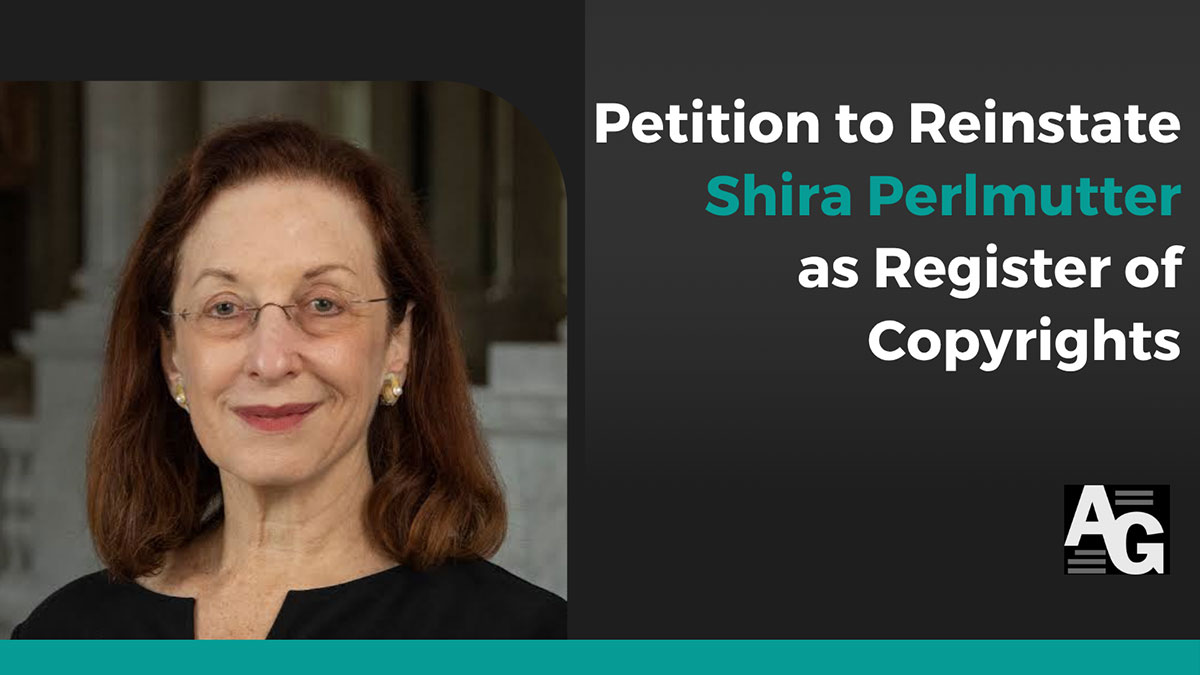
"Regardless of party, members of Congress should be deeply troubled by this action, which, if allowed to stand, will undermine public trust in the Copyright Office’s independence for years to come," the Guild asserts. The Authors Guild on May 9 also issued a forceful statement on the White House's removal of Carla Hayden, which called her firing a "shocking abuse of power."
"Dr. Hayden’s tenure was marked by visionary leadership and an unwavering commitment to inclusivity and making the Library and literary works accessible to all Americans," the Authors Guild statement reads. "As the first woman and first African American to serve as Librarian of Congress, she modernized the institution, expanded digital access, and championed initiatives that brought the Library’s vast resources to underserved communities."
The New York Times also reported on the battle for control over the library.
Author George Saunders, Oxford Librarian Richard Ovenden Among Those Slamming White House Attacks on Carla Hayden

As if the library community wasn't outraged enough by Trump's firing of Carla Hayden, White House Press secretary Katherine Leavitt's defamatory and ill-informed comments took matters to another level. In a scathing New York Times editorial, bestselling author George Saunders weighed in.
"If the White House wants to fire the librarian of Congress, it can. But it was interesting to have recently had the experience of meeting this dynamic, dedicated person, Carla Hayden, and feeling so proud that she was our librarian of Congress, then reading the White House’s sloppy, juvenile rationale for her dismissal; it gave me a visceral feeling for just how diseased this administration really is," Saunders writes. "Shame on the White House. Shame on those who should be stopping this slide into autocracy and aren’t. (I’m looking at you, John Thune, Mike Johnson and Marco Rubio.) Shame on all of us if we let these ignorant purveyors of cruelty reduce this beautiful thing we’ve built over these hundreds of years to a hollow, braying, anti-version of itself.
And in the Financial Times, Richard Ovenden, director of Oxford's Bodleian Library and author of Burning the Books: A History of Knowledge under Attack, also slams the Trump Administration's sacking of both Carla Hayden and archivist Colleen Shogan.
"The removal of Hayden and Shogan demonstrates the exercise of arbitrary power, asserting control over knowledge," Ovenden writes. "If the ideologically motivated censorship of collections and the recent mass deletion of government websites is anything to go by, the Trump administration is intent on removing swaths of knowledge from public circulation."
What's Behind Trump's Attack on the Library of Congress?

Leading off her weekly censorship news column at Book Riot, Kelly Jensen offers a primer on what the Library of Congress does, and some thoughts on why the administration is going after the library now.
"Where the dismantling of the Institute for Museums and Library Services was an opportunity to directly harm public libraries and museums nationwide–libraries, of course, being subject to over four years of attack by right-wing politicians, groups, and citizens–the move to the Library of Congress is even more strategic for this administration," Jensen observes. "In addition to being able to continue purging historic records related to the history and achievements by people of color, queer people, women, disabled people, or anyone else falling under the broad umbrella of 'diversity, equity, and inclusion' (DEI), it’s a prime opportunity to redact, revise, and plunder the record in service of the administration’s America 250 propaganda campaign."
A Big Week Ahead for IMLS
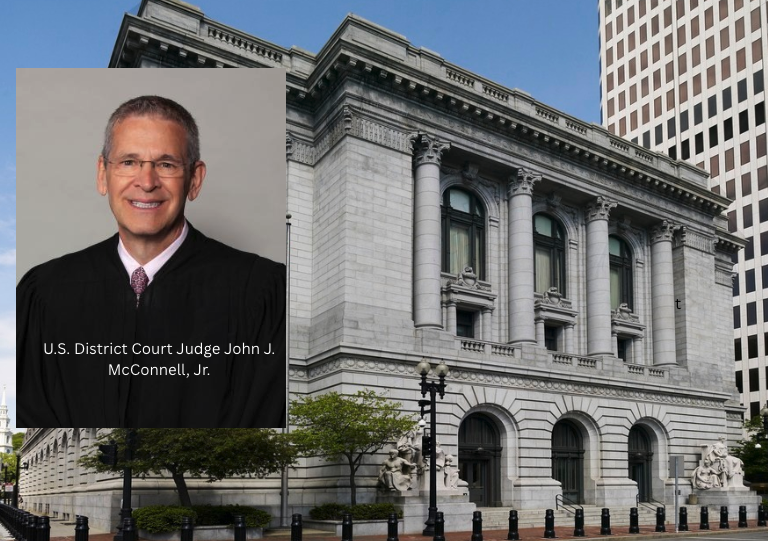
As we reported here at Words & Money, a federal judge in Rhode Island this week issued a sweeping preliminary injunction that ordered staff and grant funding slashed in the wake of a March 14 Trump Executive order to be immediately restored, and set a seven day deadline for compliance. At press time, its unclear what the government is doing to effectuate that order but a status conference set for next week should yield some clues. Meanwhile, in a May 9 filing DOJ officials have told the court that the administration will likely have trouble meeting the court's order in a week's time.
An injunction is also expected soon in a parallel case to restore the IMLS filed by ALA. Federal judge Richard J. Leon has issued a temporary restraining order blocking the further dismantling of IMLS and now has additional filings from both parties as he considers whether to issue a preliminary injunction. Observers expect an order to come before May 29, when Leon's temporary restraining order is set to expire or be extended. Stay tuned.
Rhode Island Advances 'Freedom to Read' Bill

The Providence Journal reports that the Rhode Island state senate has passed a bill to combat book bans.
"The Freedom to Read Act seeks to prevent governments from removing books they disagree with politically from the public while shielding librarians, schools and teachers from harassment and prosecution," the Journal writes. Among the bill's provisions, "it would give authors, booksellers or publishers the right to sue any government entity found to 'enforce censorship' and claim damages of up to $5,000 per censored work." Sen. Mark McKenney, the bill's lead sponsor, told reporters the bill also "contains a procedure for residents to object to specific books being in a library, but would not allow that to turn into 'harassment' like the case of a Westerly librarian who testified a year ago." The bill now heads to the House of Representatives.
ReadersFirst Applauds Passage of Connecticut Ebook Bill

As we at Words & Money reported, Connecticut has passed the first library ebook legislation since Maryland's groundbreaking law was struck down by a federal court in February 2022. And in a May 15 post, library advocacy group ReadersFirst applauded the bill and addressed its potential impact, should it be signed into law.
"With fair terms, libraries will not spend less. We may even spend more. Different authors will benefit, including new and mid-list authors because we will be able to diversify our collections more. The publishers, and more authors, will still get paid," writes St. Mary's librarian Michael Blackwell. "The follow-up argument, that libraries will 'cannibalize' digital sales, is nonsensical. We buy many, many more print books than digital at far lower prices, and that doesn’t seem to be putting the big publishers out of business. They still market heavily though libraries. If we’re such money leeches, why do they take advantage of how we promote reading?"
Librarians Weigh In on Ohio Budget Battle

The Ohio Capital Journal reports that local librarians spelled out what potential budget cuts to the state's Public Library Fund could mean for their communities.
"Programs of all kinds could be on the chopping block if funding changes are implemented, in a day and age when libraries have already had to be creative with existing funds as library demand and demand for more modern resources goes up," the report notes. "The House’s version of the budget would eliminate the 1.7% the Public Library Fund gets from the General Revenue Fund, and create a line-item appropriation... The Senate is currently working on its draft of the budget, which could contain changes to the House’s version. The two chambers will come together after the Senate approves a draft to bring forth a final draft for the governor’s signature before July 1."
The report also notes that visits to libraries in Ohio were up 3.4 million to 48 million visits statewide in 2024.
After Elections, Texas School District May Reverse Course on Book Bans

File this under elections have consequences. The Houston Chronicle reports that after voters ousted conservative Katy ISD board member Victor Perez on May 3, community members are also calling for the removal of his policies regarding book bans and transgender students.
"Perez lost his seat to newcomer James Cross in the May 3 election," the Chronicle reports. "With Perez ousted, public speakers at Monday’s board of trustees meeting implored the new board to remove the district’s book ban and transgender policies... Cross said he will not support politically-motivated policies such as book banning. Instead, he plans to focus on policies that directly help students."
ALA Sounds the Alarm After Trump Cancels Digital Equity Grants

The American Library Association this week expressed mounting concern over the Trump Administration’s cancellation of Digital Equity Act funding, a $2.75 billion, congressionally authorized program established in 2021 to help "close the digital divide in every state and territory" through grants to support broadband access and digital skills training in underserved communities. “Libraries across the country are essential leaders and partners in Digital Equity Act grant programs and are relying on this funding to advance our commitment to closing the digital divide," said ALA President Cindy Hohl, who called the administration's cancellation "abrupt and illegal."
ALA is now seeking information regarding Digital Equity Act grant cancellations and is urging library workers who have received grant termination notifications to report their program cancellation and share the impact this loss of funding will have on their library using this form.
Michigan's Patmos Library Back in the News

Bridge Michigan reports that the Patmos Library in Jamestown, Michigan, which made national headlines in 2022 after book banners looked to defund the library over allegedly inappropriate materials, is in the news again after the library's staff resigned over ill-treatment by the library's newly installed board.
“Starting with a feud over LGBTQ-themed books, the culture war took a turn last week, when five librarians quit in a dispute with a recently-elected, politically conservative board of directors," the report notes. In their resignation letter, librarians accused board members of “rude, disrespectful and unprofessional behavior,” Bridge Michigan reports, referencing rising tensions since last fall, “when a slate of six candidates supported by Ottawa Impact, a political group closely aligned with evangelical Christian organizations and involved in the original book protests, won all the seats on the board of directors.”
Michigan Librarian Sues over Book Banner's Alleged Harassment

MLive reports that a school librarian in West Michigan has filed a civil lawsuit against a parent after years of allegedly false and defamatory statements.
"Christine Beachler, a librarian at Lowell Area Schools, is suing Stefanie Boone after enduring years of false accusations, including being labeled a 'groomer' and 'smut peddler,'" the report notes. The lawsuit accuses the Moms for Liberty affiliated Boone of targeting Beachler on social media "claiming she distributes pornography to children, and engages in grooming behavior." The suit asks for "an undisclosed amount in monetary damages and for Boone to remove any posts on social media related to Beachler."
Authors Guild, Scholarly Associations Sue Over 'Unlawful' NEH Grant Terminations

The Authors Guild and a group of scholars and writers this week filed a class action lawsuit (PDF) against the National Endowment for the Humanities for "unlawfully terminating millions of dollars in committed grants from funds."
"The administration’s actions in canceling the grants were unlawful," reads an AG press release. "The administration is not free to unilaterally cancel funds that Congress has appropriated for a specific purpose—here, humanities funding. Nor can it simply refuse to pay out funds that the government has promised to grantees—many of whom have made significant investments and major decisions in reliance on that promise—especially without any individualized consideration or opportunity for appeal."
Scholarly Associations Also Sue Over NEH Actions

Meanwhile, the American Council of Learned Societies (ACLS), the American Historical Association (AHA), and the Modern Language Association (MLA) also filed a suit this week over the administration's handling of the NEH.
"The NEH’s actions and the administration’s refusal to distribute funds appropriated by Congress violate the law in multiple ways: they fail to provide reasoning for the NEH’s actions, disregard the constitutional separation of powers, and, by refusing to spend appropriations as legally required, ignore the Impoundment Control Act of 1974," a statement on the MLA's website explains.
And finally this week...

The world is watching. In a May 14 statement, FAIFE (IFLA’s Advisory Committee on Freedom of Access to Information and Freedom of Expression) said it was "deeply concerned" after "significant actions by the government in the United States" that "are fostering an atmosphere of fear and intimidation for libraries and library professionals."
According to the statement, recent U.S. government actions that exemplify IFLA's concerns include:
- The dismissal of the Librarian of Congress, reportedly linked in part to her support for diversity initiatives.
- Cuts to library funding delivered through the Institute of Museum and Library Services
- Removal of data available on government websites including data related to diversity, gender, climate, and science.
- Barriers put in place to prevent scraping of government websites for preservation
- Censorship actions requiring that certain libraries, including military academies, withdraw materials from their collection, including material on race and gender.
- Withdrawal of funding to universities based on their research and policy positions.
- Withdrawal or threats of withdrawal of legal status and/or research funding to students and faculty members at universities based on their areas of study and expression, which may be affecting library scholars and workers.
The group said it will be undertaking a project in 2025 "to expand global awareness of threats to the information environment by governments in individual countries and will call on library workers and library associations to contribute."












